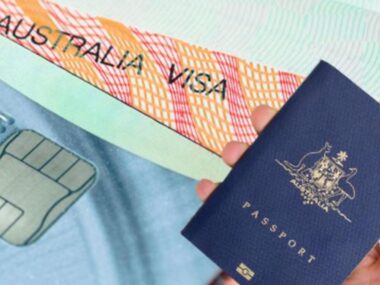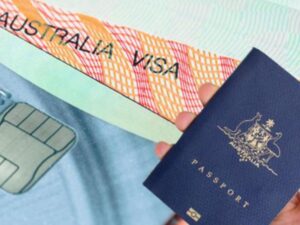From the majestic Rockies to the bustling streets of Toronto, Canada offers a unique blend of natural beauty, cultural diversity, and a welcoming atmosphere. But what if your initial visit has sparked a desire to stay longer? Whether you’re captivated by the beauty of the Canadian wilderness, seeking new career opportunities, or simply yearning to spend more time with loved ones, extending your temporary visa in Canada might as well be your next adventure.
This comprehensive guide will walk you through the intricate process of extending your stay in the Great White North. We’ll delve into the essential steps, demystify the requirements, and equip you with the knowledge to navigate the Canadian immigration system with confidence.
Understanding Your Temporary Visa
A Temporary Resident Visa (TRV), often referred to as a visitor visa, is a crucial document for individuals who wish to enter Canada for a temporary period. It grants you the legal permission to enter the country for specific purposes, such as tourism, business, visiting family and friends, or pursuing short-term studies.
Key Characteristics of a TRV:
- Limited Duration: TRVs are issued for a specific period, which can range from a few weeks to several months. This duration is determined by the purpose of your visit and the specific conditions outlined in your visa.
- Conditions of Stay: Each TRV comes with specific conditions that must be strictly adhered to. These conditions may include:
- Purpose of Visit: You are legally permitted to engage only in the activities specified in your visa. For instance, a tourist visa typically restricts you from working or studying in Canada.
- Duration of Stay: You must not overstay the authorized period. Exceeding the duration of your visa can have serious consequences, including future visa refusals and potential legal penalties.
- Financial Support: You are expected to demonstrate sufficient financial means to support yourself during your stay in Canada without relying on public funds. This may involve providing proof of funds, employment contracts, or sponsorship letters.
- No Right to Work (Generally): Unless you have a separate work permit, a standard TRV does not grant you the right to work in Canada. Engaging in any form of employment without proper authorization is a violation of your visa conditions.
- Maintaining Ties to Home Country: Canadian immigration authorities expect you to maintain strong ties to your home country. This demonstrates your intention to return after your temporary stay. Evidence of strong ties may include:
- Employment: A stable job or business in your home country.
- Family: Spouses, children, or other close family members residing in your home country.
- Property: Ownership of property or other significant assets in your home country.
Types of Temporary Resident Visas:
While the term “visitor visa” is commonly used, there are various types of TRVs, each with specific purposes and requirements:
- Tourist Visa: Issued for leisure travel, sightseeing, visiting friends and family, and other tourism-related activities.
- Business Visa: Granted for business purposes such as attending conferences, conducting market research, or negotiating contracts.
- Student Visa: Allows foreign nationals to study at designated Canadian educational institutions.
- Work Permit: Authorizes individuals to work in Canada for a specific employer or in specific occupations.
- Super Visa: A multiple-entry visa for parents and grandparents of Canadian citizens and permanent residents.
Understanding the nuances of your specific TRV is crucial for a successful stay in Canada. It ensures that you comply with all the conditions of your visa, avoid potential legal issues, and make the most of your time in the country.
Eligibility Criteria for Extending Your Temporary Visa in Canada
Extending your temporary visa in Canada requires meeting specific eligibility criteria. These criteria aim to ensure that your stay aligns with Canadian immigration laws and that you pose no risk to the country. Here’s a detailed look at the key eligibility factors:
-
Valid Temporary Resident Status:
- Unexpired Visa: Your current temporary resident visa (TRV) must be valid at the time of your extension application.
- Compliance with Visa Conditions: You must have adhered to all the conditions outlined in your original visa, such as the purpose of your visit, duration of stay, and any other restrictions.
-
Legitimate Reasons for Extension:
- Compelling Justification: You must provide a valid and compelling reason for extending your stay. This could include:
- Tourism: Further exploration of Canada, attending a significant event, or visiting family and friends.
- Business: Continuing business negotiations, attending conferences, or pursuing new business opportunities.
- Study: Extending your studies due to program length, research requirements, or academic delays.
- Medical Treatment: Continuing medical treatment not readily available in your home country.
- Maintainability of Purpose: Your reason for extending your stay must remain valid and maintainable throughout the extended period.
-
Financial Stability:
- Sufficient Funds: You must demonstrate that you have sufficient financial resources to support yourself during your extended stay in Canada. This may involve providing proof of funds, employment contracts, or sponsorship letters.
- Ability to Support Yourself: You must convince the immigration authorities that you can financially support yourself without relying on public assistance.
-
Ties to Home Country:
- Strong Ties: You must demonstrate strong ties to your home country that will encourage your eventual departure from Canada. This could include:
- Employment: A stable job or business in your home country.
- Family: Spouses, children, or other close family members residing in your home country.
- Property: Ownership of property or other significant assets in your home country.
- Intention to Return: You must clearly demonstrate your intention to return to your home country after your extended stay in Canada.
-
No Criminal Record or Security Concerns:
- Clean Record: You must not have any criminal convictions or security concerns that would make you inadmissible to Canada.
-
Meeting Specific Requirements for Your Status:
- Students: If you’re a student, you must demonstrate continued enrolment in a recognized educational institution and maintain good academic standing.
- Workers: If you’re a worker, you must continue to be employed with a valid work permit or demonstrate eligibility for a new work permit.
-
Passport Validity:
- Valid Passport: Your passport must be valid for at least the duration of your requested extension.
Important Note:
- These eligibility criteria are general guidelines. Specific requirements may vary depending on your individual circumstances and the type of temporary visa you hold.
- It’s crucial to consult the official Government of Canada website or seek professional immigration advice for the most accurate and up-to-date information.
By carefully reviewing and meeting these eligibility criteria, you can significantly increase your chances of successfully extending your temporary visa in Canada.
When to Extend Your Temporary Visa
Knowing when to extend your temporary visa in Canada is crucial to avoid legal complications and ensure a smooth stay. Here are common scenarios that might prompt you to consider an extension:
Academic Reasons
- Program Extension: If your course or program has been extended, you’ll need to apply for a study permit extension to align your visa with your studies.
- Co-op or Internship: If your study program includes work placements, you might require a work permit, which may necessitate an extension of your temporary visa.
Employment-Related Reasons
- Job Offer: If you receive a job offer that extends beyond your current work permit, you’ll need to apply for an extension to continue working legally.
- Change of Employer: Switching jobs might require a new work permit, which could involve extending your temporary visa.
Personal Reasons
- Medical Treatment: If you require extended medical treatment in Canada, you might need to extend your stay.
- Family Emergencies: Unexpected family situations might necessitate a longer stay.
- Tourism and Travel: If your initial travel plans change and you wish to stay longer for tourism or exploration, you can apply for an extension.
Important Considerations
- Timely Application: It’s essential to apply for an extension before your current visa expires. Late applications might lead to complications.
- Supporting Documentation: Prepare the necessary documents to support your extension request, such as proof of enrollment, employment contracts, or medical reports.
- Check Eligibility: Ensure you meet the eligibility criteria for extending your specific visa type.
Every situation is unique. It’s always advisable to consult the official website of Immigration, Refugees and Citizenship Canada (IRCC) or seek professional immigration advice for personalized guidance.
Extending Your Temporary Visa in Canada
Extending your stay in Canada requires a well-organized approach and a thorough understanding of the process. Here’s a detailed breakdown of the steps involved:
-
Check Your Eligibility:
- Thorough Review: Carefully examine your current visa status, ensuring it’s valid and that you’ve adhered to all its conditions.
- Assess Your Reasons: Determine a legitimate and compelling reason for extending your stay. This could be for tourism, business, studies, medical treatment, or other valid purposes.
- Review the Specific Requirements: Understand the unique eligibility criteria associated with your current visa type (e.g., student, worker, visitor).
-
Gather Essential Documents:
- Application Forms: Complete the necessary application forms accurately and truthfully. Ensure you use the correct forms for your specific situation.
- Passport and Visa: Provide copies of your current passport and visa.
- Proof of Financial Support: Gather evidence of your financial stability, such as bank statements, employment contracts, or sponsorship letters.
- Return Ticket or Travel Plans: Demonstrate your intention to leave Canada after your extended stay by providing a return ticket or detailed travel plans.
- Supporting Documentation: Depending on your reason for extension, you may need additional documents like:
- Letters of Invitation: If visiting friends or family.
- Medical Certificates: If extending for medical treatment.
- Proof of Enrolment: If extending your studies.
- Business Correspondence: If extending for business purposes.
-
Submit Your Application:
- Online Application: The preferred method is to submit your application online through the Government of Canada’s website. This offers convenience and faster processing times.
- Mail-in Application: If online submission isn’t feasible, you can mail your application to the designated processing center. Ensure all documents are properly organized and securely packaged.
-
Pay Application Fees:
- Visa Extension Fees: There are associated fees for processing your visa extension application. Pay the required fees as instructed during the application process.
-
Track Your Application:
- Online Tracking System: Utilize the Government of Canada’s online tracking system to monitor the progress of your application. This will provide updates on the status of your application and estimated processing times.
-
Receive a Decision:
- Processing Times: Processing times for visa extensions can vary depending on the application volume and complexity.
- Approval or Refusal: You will receive a decision on your application. If approved, you will be issued an extension to your temporary resident status. If refused, you may have options for appealing the decision.
Important Considerations:
- Timeliness: Apply for your extension well in advance of your current visa’s expiration date to avoid delays and potential complications.
- Honesty and Accuracy: Ensure all information provided in your application is truthful and accurate. Any discrepancies can lead to delays or even refusal.
- Seek Professional Guidance: If you have any doubts or concerns about the extension process, consult with an immigration lawyer or consultant for professional advice.
Immigration laws and regulations are subject to change. Always refer to the official Government of Canada website for the most up-to-date information and guidance.
By carefully following these steps and addressing all the requirements, you can increase your chances of successfully extending your temporary visa in Canada and continuing your journey in this beautiful country.
Key Factors to Consider Before Extending Your Temporary Visa in Canada
Before embarking on the visa extension process, it’s crucial to carefully weigh several key factors. This thoughtful consideration will help you make informed decisions and increase your chances of a successful application.
-
Purpose of Extension and Feasibility:
- Legitimate Reason: Ensure you have a valid and compelling reason for extending your stay. It should be clearly justifiable and align with Canadian immigration regulations.
- Feasibility Assessment: Evaluate the feasibility of your extension request. Consider whether your intended activities can realistically be achieved within the extended timeframe.
-
Financial Implications:
- Application Fees: Factor in the application fees associated with the visa extension process.
- Living Expenses: Assess the potential living expenses during the extended period, ensuring you have sufficient financial resources to support yourself without relying on public assistance.
- Potential Costs: Consider potential costs associated with gathering supporting documentation, such as medical certificates or proof of enrollment.
-
Time Constraints:
- Application Deadlines: Be mindful of the application deadlines. Submit your application well in advance of your current visa’s expiration to avoid potential delays and complications.
- Processing Times: Research the typical processing times for visa extensions. Factor these timelines into your plans to ensure a smooth transition.
-
Potential Risks and Challenges:
- Risk of Refusal: Understand that there’s always a risk of your application being refused. Carefully assess your eligibility and ensure you meet all the requirements.
- Legal and Administrative Challenges: Be prepared for potential legal or administrative challenges that may arise during the extension process.
-
Personal and Professional Considerations:
- Personal Impact: Consider how an extended stay in Canada will impact your personal life, career goals, and long-term plans.
- Professional Opportunities: Evaluate whether extending your stay aligns with your professional aspirations and career development goals.
-
Alternative Options:
- Explore Alternatives: Consider alternative options, such as applying for a different type of visa that may be more suitable for your long-term goals.
By carefully considering these key factors, you can make a well-informed decision about whether to extend your temporary visa in Canada. This proactive approach will help you navigate the process effectively and increase your chances of a successful outcome.
Frequently Asked Questions about Extending Your Temporary Visa in Canada (FAQs)
Let’s now see some of the major questions being asked about how you can extend your temporary visa in Canada:
Q: Can I extend my temporary visa if I overstay my initial permitted stay?
A: No, you cannot extend your visa if you have already overstayed. You may be subject to penalties and immigration consequences.
Q: How long does it usually take to process a visa extension application?
A: Processing times vary depending on the type of visa and the volume of applications. It’s recommended to check the IRCC website for the most current processing times.
Q: Can I leave Canada while my visa extension application is being processed?
A: It’s generally not advisable to leave Canada while your application is pending. Doing so might affect your application status.
Q: Can I extend my visitor visa to work in Canada?
A: No, a visitor visa does not permit work in Canada. You would need to apply for a work permit separately.
Q: Can I extend my study permit if I change my program of study?
A: Yes, you may need to extend your study permit if you change your program. You’ll need to provide a new acceptance letter from your new educational institution.
Q: What happens if my work permit expires before I find a new job?
A: If you lose your job, you may have a grace period to find a new job and extend your work permit. However, the specific rules vary, so it’s essential to check with IRCC.
Q: Can I apply for a visa extension online?
A: Yes, most visa extension applications can be submitted online through the IRCC website.
Q: What documents do I need to submit with my visa extension application?
A: The required documents vary depending on the type of visa and the reason for extension. Generally, you’ll need your passport, current visa, proof of financial support, and a letter explaining your reason for extending your stay.
Q: What if my application is rejected?
A: If your application is rejected, you will receive a notification explaining the reasons. You may have options to appeal the decision, but this depends on the specific circumstances.
This information is a general guide. Always consult the official IRCC website or seek professional immigration advice for the most accurate and up-to-date information.
Conclusion
Extending your temporary visa in Canada can be a complex process, but with careful planning and preparation, it’s achievable. Understanding your eligibility, gathering the necessary documents, and submitting a complete application are crucial steps. While the process might seem daunting, the ability to extend your stay in Canada can offer opportunities for further studies, work experience, or simply enjoying the country for a longer period.







